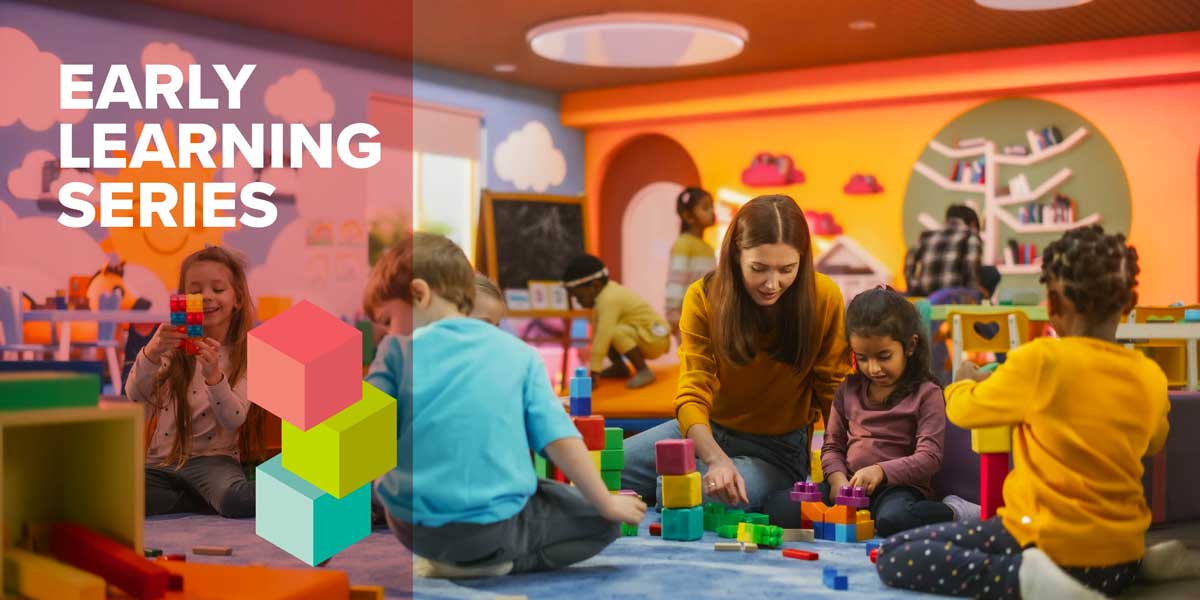Leadership Is Child’s Play: Leading Early Learning Through Play-Based Literacy

Rather than relying solely on drills or rote learning, innovative early childhood educators and program leaders recognize the importance of play as a central strategy for literacy development.
- Play promotes literacy, language, and executive function through storytelling, role-play, singing, and rhyming games
- Guided play, in which educators support and extend children’s play, bridges exploration and instruction, helping develop skills like phonemic awareness and emergent reading
- Evidence-based frameworks (e.g., Common Ground Collaborative) are promoting play-based curricula that emphasize inquiry, curiosity, and social and emotional growth
Rather than an optional add-on, play becomes the primary vehicle through which children engage with language, symbols, and meaning in ways that are relevant, accessible, and engaging.
Play-Based Instruction Continuum
Play-based instruction exists along a continuum, from fully child-led to more structured, teacher-guided experiences. Each type of instruction supports learning differently and can be used based on the needs of the child and goals of the lesson.
Free Play
Children choose their own play themes, materials, and partners with little or no adult guidance.
Strengths
- Encourages creativity, independence, and collaboration
- Reflects children's interests and imaginations
Challenges
- Less connected to specific learning goals
- May lack new learning without adult support
Guided Play
Children lead the play, while adults add materials, ask questions, or join in to extend learning.
Strengths
- Blends exploration with intentional teaching
- Supports language, thinking, and social skills
Challenges
- Requires skill to balance support without controlling play
- May be misunderstood as too unstructured
Directed Play
Teachers design playful activities with specific learning goals, such as games to support literacy or math.
Strengths
- Connects play with curriculum outcomes
- Helps focus attention while keeping learning fun
Challenges
- May become too structured and less joyful
- Could reduce creativity if overused
Pedagogical Leadership in Practice
Strong leadership is key to high-quality play-based learning. Research highlights several critical roles for leaders in early education:
- Effective leaders support environments that blend child choice, teacher guidance, and meaningful assessment—essential components of purposeful play.
- Pedagogical leadership fosters innovation. When leaders support educators in adapting to learners' needs, they promote collaboration, improvement, and long-term quality teaching.
- Shared or distributed leadership, where teachers take on leadership roles, improves instruction and teacher retention, which benefits children directly.
Leadership Practices That Bring Play to Life
- Design purposeful spaces that include print, symbols, and child choice—aligned with children's interests and cultural backgrounds
- Use the play continuum to plan and adjust instruction while preserving student agency
- Support educators as co-learners, promoting collaboration, reflection, and innovation through professional learning communities
- Assess what matters, measuring not just academic skills, but also growth in language, engagement, and communication with families
Role-Based Recommendations for Leadership
- School leaders or principals: Learn about early childhood and play-based teaching. Visit classrooms, support professional learning, and advocate for environments that balance play and academic goals.
- Program directors or pedagogical leaders: Coach educators in guided play strategies, model scaffolding, and foster teacher leadership in creating rich, playful literacy experiences.
- Educators or teachers: Use developmentally appropriate practice to design literacy-rich play spaces that reflect students’ language, culture, and experiences.
Leadership Is Critical to Promoting Play-Based Learning
Early literacy flourishes when leaders value and prioritize play as a powerful instructional approach. When principals advocate for developmentally appropriate practice, pedagogical leaders coach for intentionality, and teachers design meaningful experiences—children thrive.
By leading with the belief that play drives learning, we support young learners who are not only skilled readers but also curious, capable, and confident. When play is seen as essential—not extra—and leadership champions it at every level, we set the foundation for lifelong success.



